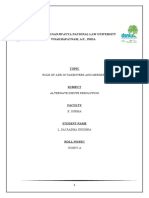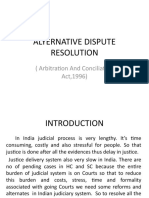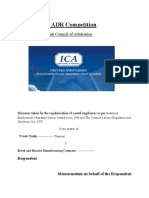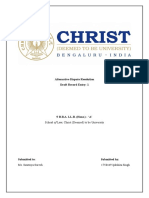0% found this document useful (0 votes)
39 views22 pagesAdr Project
The document discusses the importance and mechanisms of Alternative Dispute Resolution (ADR) in India, highlighting its role in alleviating the burden on traditional courts by providing faster, cost-effective, and confidential means of resolving disputes. It outlines various types of ADR, including arbitration, mediation, and conciliation, and emphasizes the legal framework supporting ADR in India, such as the Arbitration and Conciliation Act of 1996 and the Legal Services Authorities Act of 1987. Additionally, it addresses the advantages and limitations of ADR, including challenges in implementation and the need for greater awareness and infrastructure.
Uploaded by
berarai50Copyright
© © All Rights Reserved
We take content rights seriously. If you suspect this is your content, claim it here.
Available Formats
Download as DOCX, PDF, TXT or read online on Scribd
0% found this document useful (0 votes)
39 views22 pagesAdr Project
The document discusses the importance and mechanisms of Alternative Dispute Resolution (ADR) in India, highlighting its role in alleviating the burden on traditional courts by providing faster, cost-effective, and confidential means of resolving disputes. It outlines various types of ADR, including arbitration, mediation, and conciliation, and emphasizes the legal framework supporting ADR in India, such as the Arbitration and Conciliation Act of 1996 and the Legal Services Authorities Act of 1987. Additionally, it addresses the advantages and limitations of ADR, including challenges in implementation and the need for greater awareness and infrastructure.
Uploaded by
berarai50Copyright
© © All Rights Reserved
We take content rights seriously. If you suspect this is your content, claim it here.
Available Formats
Download as DOCX, PDF, TXT or read online on Scribd
/ 22

























































































